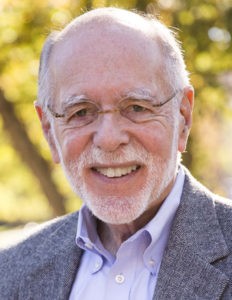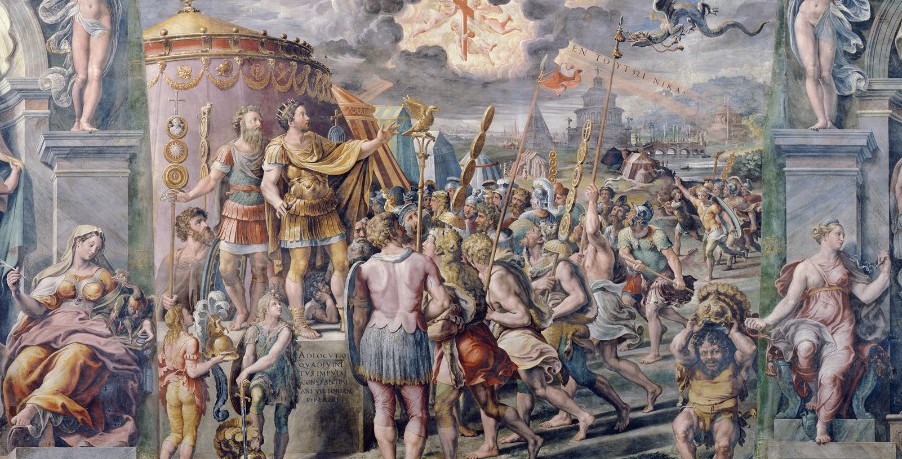The storming of the American Capitol on Jan. 6 — with its profusion of Bibles, crosses and other Christian symbols — placed a gigantic exclamation point on the unease American Christians always have felt with the First Amendment to the Constitution: “Congress shall make no law respecting an establishment of religion, or prohibiting the free exercise thereof.”
The problem was simple and clear: It denied them the legal means to create a Christian nation.
In many respects, Jesus and the First Amendment were on the very same page.

Richard T. Hughes
Jesus devoted his ministry to what he called “the kingdom of God,” and when two of his disciples sought positions of honor and authority in that kingdom, Jesus told them they had missed the point.
Comparing the kingdom of God with the Roman Empire, he told them, “The rulers of the Gentiles lord it over them, and their great men exercise authority over them. But, he said, “It shall not be so among you.” Instead, “Whoever would be first among you must be your slave.”
With those 10 words, Jesus defined the heart of the kingdom of God.
But the magnetic pull of 1,400 years of Christian rule and domination, from Emperor Constantine in the early fourth century to the birth of the American nation in 1776, proved too powerful, even in this new nation, for most white Christians to escape.
A brief tour of history will help us grasp this point.
From Roman persecution to Roman embrace
For Christianity’s first three centuries, Rome outlawed the Christian religion and often persecuted Jesus’ followers.
Then, in 313 C.E., Constantine legalized Christianity, and a few decades later, Emperor Theodosius made it the empire’s only legal religion. Now, to reject Christianity meant one’s likely death, but to embrace Christianity was a potential key to privilege and power.
“The Roman Empire had embraced the religion of Jesus, only to subvert the heart of Jesus’ work.”
In effect, the Roman Empire had embraced the religion of Jesus, only to subvert the heart of Jesus’ work — the upside-down vision of the kingdom of God where the first are last and the last are first and one finds power in becoming a slave.
For the next 13 centuries, Jesus’ vision languished as every nation in Europe accorded the church an official position of power and dominance. Occasional bands of dissenters — like the 16th-century Anabaptists, for example — sought to recover Jesus’ vision of the kingdom of God. But their efforts proved so threatening to the dominant religion of privilege and power that the secular and religious authorities, acting in concert, sought to eradicate these people from the face of the earth.
The American experiment
Then, in 1791, the new American nation offered Christians an off ramp in the form of the First Amendment to the Constitution: “Congress shall make no law respecting an establishment of religion, or prohibiting the free exercise thereof.”
Given the 14-century history of Christian dominance, however, most Christians in the new American nation failed to grasp the First Amendment for the extraordinary gift it was. And so they set about to create a Christian nation in spite of legal constraints.
“Most Christians in the new American nation failed to grasp the First Amendment for the extraordinary gift it was.”
Stifled by the law, they turned instead to the power of persuasion through a massive revival we know as the Second Great Awakening. Reaching into every nook and cranny of this new nation, the Second Great Awakening did its work for roughly 30 years (1801-1830), and by the time it had run its course, leaders of that revival had successfully created what we know today as “Christian America.”
The irony was that “Christian America” was still a religion of privilege and power, especially for white men of wealth, with little room for the Jesus who told his disciples, “But it shall not be so among you,” for “whoever would be first among you must be your slave.”
Black Christians understood the problem
Black Christians understood this, of course, for Jesus spoke directly into their experience, and over the course of American history, the Black church is the only version of American Christianity that has consistently understood and embraced Jesus’ vision of the kingdom of God.
Then came the 1960s, the decade that challenged the ethics of power and dominance that the white church in America had practiced since the birth of the nation.
It challenged the economic and military exploitation of smaller and poorer nations like Vietnam. And through the Civil Rights Movement, it challenged white privilege and power and the segregation of human beings based on race. Significantly, Martin Luther King Jr., the man who led that challenge, grounded it squarely in Jesus’ vision of the kingdom of God.
By the time the 1960s had run its course, “Christian America” was on its heels, along with white privilege and male privilege and every other kind of exclusive privilege for which “Christian America” always had stood. That was the perfect time for “Christian America” to finally take stock of itself in the light of the teachings of Jesus on the one hand and the First Amendment on the other.
“Instead, it doubled down with newly devised attempts to exert Christian control at every level of government.”
Some segments did, but the large evangelical segment did not. Instead, it doubled down with newly devised attempts to exert Christian control at every level of government, from the court house to the state house to the United States Capitol.
Then, in 2008, the election of the nation’s first Black president signaled to all with eyes to see that “Christian America” and the values of white, male dominance for which it had always stood, was collapsing.
Is this the end?
Eight years later, in 2016, Robert P. Jones documented the stunning level of that collapse in his book, The End of White Christian America.
This is the history that helps us grasp at least part of the meaning of the insurrection of Jan. 6, 2021. Facing its marginalization, white “Christian America” already had sought protection from a president hostile to the values of Jesus. And now, with that president soundly defeated, “Christian America” sought to retain control by force.
The irony, however, is what Jesus taught us 2,000 years ago: If you want to live, you must die; if you want to be first, you must be last; and if you seek to prosper, you must become a slave.
The only way for Christianity to recapture its relevance in American life is to take advantage of the off ramp offered by the First Amendment and, finally, after 245 years of American history, begin to embrace Jesus’ vision of the upside-down kingdom of God.
Richard T. Hughes is scholar in residence in the Center for Christianity and Scholarship at Lipscomb University and the author of Christian America and the Kingdom of God and Myths America Lives By: White Supremacy and the Stories that Give Us Meaning.
Related articles:
Reports of the death of white Christian America are greatly exaggerated | Opinion by Wendell Griffen
Jesus, ‘Trumpism’ and nationalism: the fake news of a Christian America | Opinion by Andrew Daugherty
‘The Critique’ versus ‘The Heroic Narrative’ defines the debate in America today | Opinion by Alan Bean
Dear white Christians, are you done praying yet? | Opinion by Natasha Nedrick
‘God bless white America’: Why we need to overturn white racial mythologies | Opinion by Greg Garrett


